| Date | Text | |
|---|---|---|
30 Nov 1901

Hermann Emil Fischer |
Hermann Emil Fischer (chemistry) Hermann Emil Fischer and Joseph von Mering discover that barbitone (barbital or Veronal) is an effective hypnotic agent. It becomes the first commercially marketed barbiturate, being used as a treatment for insomnia from 1903. |
|
30 Nov 1901
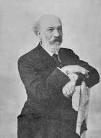
Auguste Verneuil |
Auguste Verneuil (chemistry) Auguste Verneuil develops the Verneuil process for making synthetic rubies. |
|
30 Nov 1901

Mount Pelée |
Mount Pelée (earth sciences) Eruption of Mount Pelée in Martinique. |
|
30 Nov 1901

Walter Sutton |
Walter Sutton (genetics) Walter Sutton (in the United States) and Theodor Boveri (in Germany) independently develop the Boveri–Sutton chromosome theory, explaining the mechanism underlying the laws of Mendelian inheritance by identifying chromosomes as the carriers of genetic material. |
|
30 Nov 1901

Gyula Farkas |
Gyula Farkas (mathematics) Gyula Farkas publishes the first proof of Farkas' lemma. |
|
30 Nov 1901

Henri Lebesgue |
Henri Lebesgue (mathematics) Henri Lebesgue introduces the theory of Lebesgue integration. |
|
30 Nov 1901

Barnum Brown |
Barnum Brown (paleontology) Remains of the second Tyrannosaurus rex specimen, the first recognized as such, are excavated by Barnum Brown. |
|
30 Nov 1901
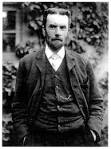
Oliver Heaviside |
Oliver Heaviside (physics) Oliver Heaviside and Arthur E. Kennelly independently predict the existence of what will become known as the Kennelly-Heaviside Layer of the ionosphere. |
|
30 Nov 1901

James Jeans |
James Jeans (physics) James Jeans finds the length scale required for gravitational perturbations to grow in a static nearly homogeneous medium. |
|
30 Nov 1901

Philipp Lenard |
Philipp Lenard (physics) Philipp Lenard observes that maximum photoelectron energies are independent of illuminating intensity but depend on frequency. |
|
30 Nov 1901

Gilbert N. Lewis |
Gilbert N. Lewis (physics) Gilbert N. Lewis develops the cubical atom atomic model. |
|
30 Nov 1901

Theodor Svedberg |
Theodor Svedberg (physics) Theodor Svedberg suggests that fluctuations in molecular bombardment cause the Brownian motion. |
|
30 Nov 1901

William Bayliss |
William Bayliss (physiology) William Bayliss and Ernest Starling make the first discovery of a hormone, secretin. |
|
30 Nov 1901

Vienna Psychoanalytic Society |
Vienna Psychoanalytic Society (psychology) Vienna Psychoanalytic Society begins to meet as the Wednesday Psychological Society in Sigmund Freud's apartment. |
|
30 Nov 1901
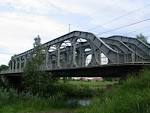
Vierendeel bridge |
Vierendeel bridge (technology) First Vierendeel bridge built, across the Scheldt at Avelgem in Belgium. |
|
30 Nov 1901
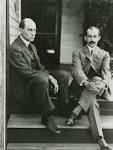
Orville and Wilbur Wright |
Orville and Wilbur Wright (technology) Orville and Wilbur Wright fly for the first time at Kitty Hawk, North Carolina |
|
30 Nov 1901

Vasily Dokuchaev |
death Vasily Dokuchaev Vasily Dokuchaev (born 1845), geologist. |
|
01 Jan 1902

Nurses Registration Act 1901 |
Nurses Registration Act 1901 (medicine) Nurses Registration Act 1901 comes into effect in New Zealand, making it the first country in the world to require state registration of nurses. On January 10, Ellen Dougherty becomes the world's first registered nurse. |
|
24 Jan 1902
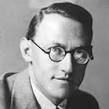
Oskar Morgenstern |
birth Oskar Morgenstern Born 24 Jan 1902; died 26 Jul 1977 at age 75. German-American economist and mathematician who popularized “game theory” which mathematically analyzes behaviour of man or animals in terms of strategies to maximize gains and minimize losses. He coauthored Theory of Games and Economic Behavior (1944), with John von Neumann, which extended Neumann's 1928 theory of games of strategy to competitive business situations. They suggested that often in a business situation (“game”), the outcome depends on several parties (“players”), each estimating what all of the others will do before determining their own strategy. Morgenstern was a professor at Vienna University, Austria, from 1931 until the Nazi occupation in 1938), when he fled to America and joined the faculty at Princeton University. His later publications included works on economic prediction and aspects of U.S. defence. |
|
10 Feb 1902

Walter Houser Brattain |
birth Walter Houser Brattain Walter Houser Brattain (died 1987), American physicist. |
|
16 Feb 1902

Zhang Yuzhe |
birth Zhang Yuzhe Zhang Yuzhe (died 1986), Chinese astronomer. |
|
06 Mar 1902

Moritz Kaposi |
death Moritz Kaposi Moritz Kaposi (born 1837), dermatologist. |
|
12 Apr 1902

Alfred Cornu |
death Alfred Cornu Alfred Cornu (born 1841), physicist. |
|
03 May 1902
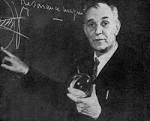
Alfred Kastler |
birth Alfred Kastler Born 3 May 1902; died 7 Jan 1984 at age 81. French physicist who won the Nobel Prize for Physics in 1966 for his discovery and development of methods for observing Hertzian resonances within atoms. This research facilitated the greater understanding of the structure of the atom by studying the radiations that atoms emit when excited by light and radio waves. He developed a method called "optical pumping" which caused atoms in a sample substance to enter higher energy states. This idea was an important predecessor to the development of masers and the lasers which utilized the light energy that was re-emitted when excited atoms released the extra energy obtained from optical pumping. |
|
15 May 1902

Claim of powered flight |
Claim of powered flight In 1902, according to local legend, an unwitnessed heavier than air flight took place in a 20-h.p. steam-engined aircraft as claimed by Lyman Gilmore of Grass Valley, California. History cannot document Gilmore's fantasy of becoming the first person to achieve powered flight. Doubt was overwhelming, yet he spent the rest of his life trying to prove his claim, and he remains a skeptical footnote in history. Nevertheless, he was was an inventive aeronautical visionary, even while being a secretive, eccentric recluse. He did patent a steam-powered aircraft, and built model airplanes. He has a more substantiated claim for building the first commercial airport, the Gilmore Aerodrome. His airplanes and hangers burned to the ground in 1935. |
|
15 May 1902

Lyman Gilmore |
Lyman Gilmore (aeronautics) Lyman Gilmore claims to have flown his steam-powered fixed-wing aircraft, although his proof is supposedly destroyed in a 1935 fire. |
|
17 May 1902
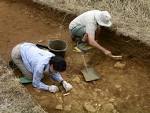
Archaeologist |
Archaeologist (history of science) Archaeologist Valerios Stais identifies the Antikythera mechanism, now considered to be the oldest known analog computer. |
|
25 May 1902

Calvin Souther Fuller |
birth Calvin Souther Fuller Calvin Souther Fuller (died 1994), American physical chemist at AT&T Bell Laboratories. |
|
26 May 1902

Almon Strowger |
death Almon Strowger Almon Strowger (born 1839), telecommunications engineer. |
|
10 Jun 1902

Air brake |
Air brake In 1902, An “Automatic Air Brake” patent was issued to black American inventor Granville T. Woods (U.S. No. 701,981), which was an important safety device for the railroads. |
|
10 Jun 1902

Window envelope |
Window envelope In 1902, the first U.S. patent for a window envelope was issued to Americus F. Callahan of Chicago, Ill., which he called the outlook envelope (U.S. No. 701,839). He leased the patent to the Envelope company of Springfield, Mass., which began its manufacture in Jul 1902. This style of envelope was able to save expense of printing or labour of addressing, and in addition save time in preparing the message for dispatch when the customary addresses are already on the letter paper itself. |
|
16 Jun 1902

Bertrand Russell |
Bertrand Russell (mathematics) Bertrand Russell writes to Gottlob Frege informing him of the problem in naive set theory that will become known as Russell's paradox. |
|
08 Aug 1902
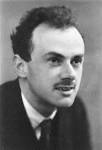
Paul Dirac |
birth Paul Dirac Paul Dirac (died 1984), English physicist. |
|
10 Aug 1902

Arne Tiselius |
birth Arne Tiselius Born 10 Aug 1902; died 29 Oct 1971 at age 69. Arne Wilhelm Kaurin Tiselius was a Swedish biochemist who won the Nobel Prize for Chemistry in 1948 for his work on electrophoresis and other new methods of separating and detecting colloids and serum proteins. In electrophoresis - a method of separating chemically similar charged colloids - an electrical field is applied to the sample, and particles with different sizes migrate at different rates to the pole of opposite charge, enabling them to be detected and identified. Using the technique on blood serum Tiselius confirmed the existence of four different groups of proteins - albumins and alpha, beta, and gamma globulins. Tiselius also conducted work on chromatography (from 1940) and partition and gel filtration (from the late 1950s). |
|
13 Aug 1902

Felix Wankel |
birth Felix Wankel Felix Wankel (died 1988), German mechanical engineer. |
|
05 Sep 1902
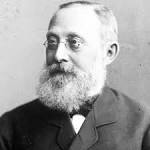
Rudolf Virchow |
death Rudolf Virchow Rudolf Virchow (born 1821), pathologist and biologist. |
|
23 Sep 1902
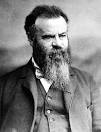
John Wesley Powell |
death John Wesley Powell Died 23 Sep 1902 at age 68 (born 24 Mar 1834). American geologist and ethnologist who published the first classification of American Indian languages and was the first director of the U.S. Bureau of Ethnology (1879-1902). In 1869, despite having lost his right arm in the Civil War, Powell outfitted a small party of men in wooden boats in Wyoming, and descended down into the then unknown Colorado River. Daring that mighty river for a thousand miles of huge, horrifying rapids, unsuspected dangers, and endless hardship, he and his men were the first to challenge the mysterious Grand Canyon. |
|
30 Sep 1902

Rayon |
Rayon In 1902, the "making of cellulose esters" was jointly patented by William H. Walker, Arthur D. Little and Harry S. Mork of Massachusetts. (U.S. No. 709922). A month later, on 28 Oct 1902, they also patented artificial silk (No. 712,200). Viscose was an early name for the product. The term rayon was adopted by the textile industry in 1924 to replace "artificial silk" and similar names. It was said to derive from the French for "shine" - a reference to its silklike lustre. Unlike most man-made fibers, rayon is not synthetic. Made from wood pulp, a naturally-occurring, cellulose-based raw material, rayon's properties are more similar to those of natural cellulosic fibers, such as cotton or linen, than those of petroleum-based synthetic fibers such as nylon. |
|
01 Oct 1902

Mountain gorillas |
Mountain gorillas (zoology) First Mountain gorillas (Gorilla beringei beringei) discovered by Captain Robert von Beringe in German East Africa. |
|
12 Nov 1902

William Henry Barlow |
death William Henry Barlow William Henry Barlow (born 1812), railway civil engineer. |
|
05 Dec 1902

Johannes Wislicenus |
death Johannes Wislicenus Died 5 Dec 1902 at age 67 (born 24 Jun 1835). Johannes Adolph Wislicenus was a German chemist whose pioneering work led to the recognition of the importance of the spatial arrangement of atoms within a molecule. He is noted for his work on the lactic acids, and in particular for his discoveries in the study of the geometrical isomerism (the existence of identical formulae with differing chemical properties) of organic compounds. |
|
10 Dec 1902

Old Aswan Dam |
Old Aswan Dam (technology) Old Aswan Dam, designed by William Willcocks, completed across the River Nile in Egypt. |
|
22 Dec 1902

Baron Richard von Krafft-Ebing |
death Baron Richard von Krafft-Ebing Died 22 Dec 1902 at age 62 (born 14 Aug 1840). German neurologist and neuropsychiatrist (baron) who opened the field of sexual psychopathology. He was recognized as an authority on deviant sexual behavior and its medicolegal aspects. He was the first to write on the subject in his Psychopathia Sexualis (1886). It contained 51 case histories out of the hundreds of medical and court reports he had collected. Therein, he also coined the terms sadism and masochism derived from the names of the Marquis de Sade and Leopold von Sacher-Masoch (1836-1895). He also introduced therm “paranoia.” His work provided a foundation for the work of Sigmund Freud two decades later. |
|
22 Dec 1902

Richard von Krafft-Ebing |
death Richard von Krafft-Ebing Richard von Krafft-Ebing (born 1840), sexologist. |
|
30 Dec 1902

Discovery Expedition |
Discovery Expedition (exploration) Discovery Expedition: Scott, Shackleton and Wilson reach the furthest southern point reached thus far by man, south of 82°S. |